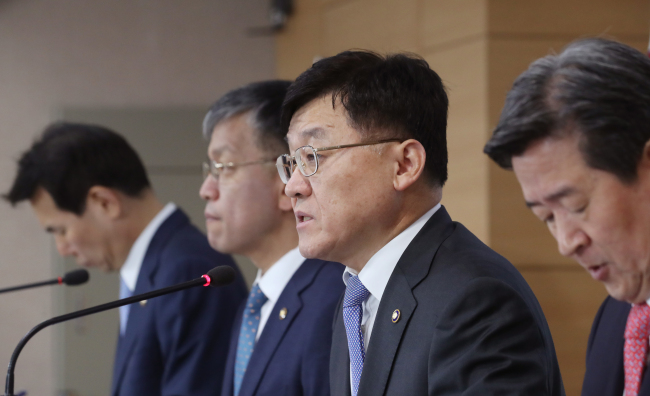The Korean government vowed Monday to inject 3.7 trillion won ($3.2 billion) into five shipbuilder-concentrated areas by 2020 to alleviate the financial challenges of crisis-hit companies and lower regional dependence on the shipbuilding industry.
The Ministry of Industry, Trade and Energy said it would firstly provide 2.7 trillion won by next year to five areas -- Ulsan, Busan, South Gyeongsang Province and South and North Jeolla provinces, where shipbuilders, subcontractors and equipment businesses are clustered. About 93 percent of Korean shipbuilders’ production is concentrated in these five regions.
 |
Jeong Marn-ki (second from right), vice minister of the Industry Trade and Energy Ministry delivers remarks during a briefing on plans for enhancing the shipbuilding industry, at the Seoul Government Complex in central Seoul, Monday. (Yonhap) |
This is part of comprehensive measures to revitalize the economy of shipbuilder-concentrated regions.
Amid tightening restructuring moves and the sluggish economy, the number of orders in these regions plummeted by 33 percent in nearly two years, while the number of companies struggling with overdue wages increased by 36.5 percent, the government said.
The 2.7 trillion-won financial package for next year will comprise of five programs -- 680 billion won of emergency funds, 800 billion won of special guarantees for firms that need loans, 600 billion won of loan programs for small businesses, 200 billion won for improving shipbuilders’ systems and 400 billion won for upgrading the technology of shipbuilding equipment businesses.
In the long term, the government said it will invest 1 trillion won in cultivating new alternative business drives by connecting the characteristics of the five regions with surrounding industries to reduce heavy reliance on the shipbuilding industry.
In South Gyeongsang Province, the ministry will foster the intelligent machine industry. The region’s three cities, Geojae, Tongyeong and Goseong, will be developed to become supply bases for the machine and material industries.
Ulsan will target the machine design industry, benchmarking on the city’s strategic goal to raise the environment-friendly car industry. The shipbuilding equipment industry shares technological similarities with the machine design sector, the ministry said.
Busan will utilize the marine tourism infrastructures, while the South Jeolla Province will seek alternatives by raising the drone industry in Goheung, and marine wine energy business in Yeongam and Mokpo.
With these measures, the government aims to cut dependence on shipbuilders from 65 percent to 22 percent by 2025, and boost regional production from 90 trillion won to 152 trillion won at the same time.
The association of shipbuilders’ unions, however, expressed skepticism over the efficacy of the plans.
“It is doubtful whether the government has detailed plans. (The unions) do not see the associations between the shipbuilding industry and drone or marine tourism industries,” the unions said.
The ministry said specific plans are yet to be released.
“(The government) is fully discussing with municipal governments to reflect the needs of the regions. The specific plans and their needs may change, so the ministry is mulling whether to release specific plans for now,” a ministry official said.
By Lee Hyun-jeong (
rene@heraldcorp.com)





![[Exclusive] Hyundai Mobis eyes closer ties with BYD](http://res.heraldm.com/phpwas/restmb_idxmake.php?idx=644&simg=/content/image/2024/11/25/20241125050044_0.jpg)
![[Herald Review] 'Gangnam B-Side' combines social realism with masterful suspense, performance](http://res.heraldm.com/phpwas/restmb_idxmake.php?idx=644&simg=/content/image/2024/11/25/20241125050072_0.jpg)

